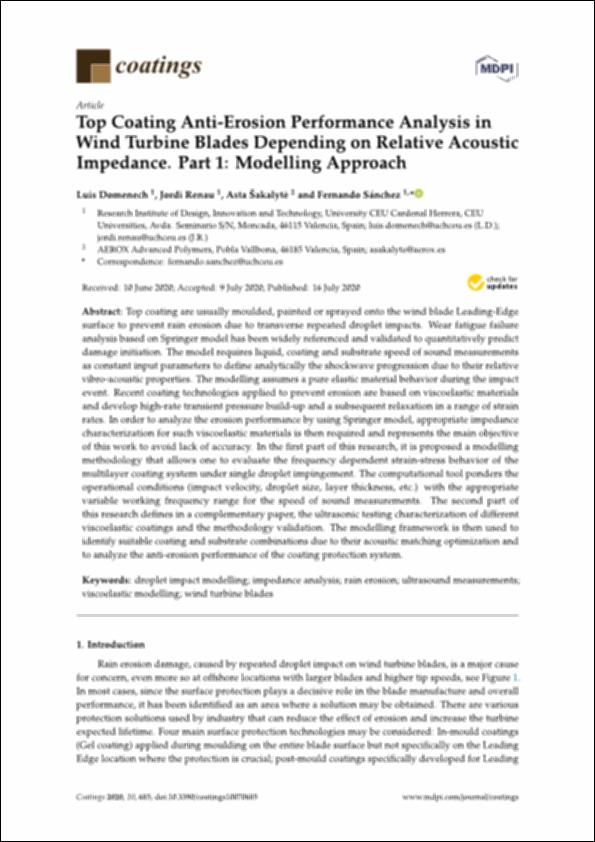Por favor, use este identificador para citar o enlazar este ítem:
http://hdl.handle.net/10637/12604Top coating anti-erosion performance analysis in wind turbine blades depending on relative acoustic impedance. Part 1, Modelling approach
| Título : | Top coating anti-erosion performance analysis in wind turbine blades depending on relative acoustic impedance. Part 1, Modelling approach |
| Otros títulos: | Modelling approach |
| Autor : | Doménech Ballester, Luis Renau Martínez, Jordi Sakalyté, Asta Sánchez López, Fernando |
| Materias: | Coatings.; Materiales de revestimiento.; Rain erosion.; Wind power.; Erosión pluvial.; Energía eólica. |
| Editorial : | MDPI |
| Citación : | Domenech, L., Renau, J., Šakalytė, A. & Sánchez, F. (2020). Top coating anti-erosion performance analysis in wind turbine blades depending on relative acoustic impedance. Part 1, Modelling approach. Coatings, vol. 10, i. 7 (16 jul.), art. 685. DOI: https://doi.org/10.3390/coatings10070685 |
| Resumen : | Top coating are usually moulded, painted or sprayed onto the wind blade Leading-Edge surface to prevent rain erosion due to transverse repeated droplet impacts. Wear fatigue failure analysis based on Springer model has been widely referenced and validated to quantitatively predict damage initiation. The model requires liquid, coating and substrate speed of sound measurements as constant input parameters to define analytically the shockwave progression due to their relative vibro-acoustic properties. The modelling assumes a pure elastic material behavior during the impact event. Recent coating technologies applied to prevent erosion are based on viscoelastic materials and develop high-rate transient pressure build-up and a subsequent relaxation in a range of strain rates. In order to analyze the erosion performance by using Springer model, appropriate impedance characterization for such viscoelastic materials is then required and represents the main objective of this work to avoid lack of accuracy. In the first part of this research, it is proposed a modelling methodology that allows one to evaluate the frequency dependent strain-stress behavior of the multilayer coating system under single droplet impingement. The computational tool ponders the operational conditions (impact velocity, droplet size, layer thickness, etc.) with the appropriate variable working frequency range for the speed of sound measurements. The second part of this research defines in a complementary paper, the ultrasonic testing characterization of di erent viscoelastic coatings and the methodology validation. The modelling framework is then used to identify suitable coating and substrate combinations due to their acoustic matching optimization and to analyze the anti-erosion performance of the coating protection system. |
| Descripción : | Este artículo se encuentra disponible en la siguiente URL: https://www.mdpi.com/2079-6412/10/7/685 Este artículo pertenece al número especial "Recent trends in coatings and thin film?modeling and application". |
| URI : | http://hdl.handle.net/10637/12604 |
| Derechos: | http://creativecommons.org/licenses/by/4.0/deed.es |
| ISSN : | 2079-6412 (Electrónico). |
| Fecha de publicación : | 16-jul-2020 |
| Centro : | Universidad Cardenal Herrera-CEU |
| Aparece en las colecciones: | Dpto. Matemáticas, Física y Ciencias Tecnológicas |
Los ítems de DSpace están protegidos por copyright, con todos los derechos reservados, a menos que se indique lo contrario.


